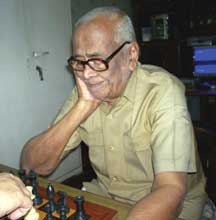Magazine
Pawns and Queens

Liberate our seniors - to work!
| Were you planning on visiting my grandmother in Mumbai on Monday afternoon?”
“Sorry, you won’t be able to. She is working these days, thrice a week, manning the cash counters at Sahakari Bhandar. If you notice an animated, podgy lady there with a warm smile and a head full of proud sindoor, that would be my grandma.” I am afraid the words have a tinge of wistfulness and muse. I’ve wondered often if I could express them to anyone, ever. The idea of my grandmother working in public, greeting customers, asking them about their shopping experience, seems so unworldly, almost ludicrous. She would much rather spend three hours sitting alone in her balcony, entertaining herself by observing life on the hustling streets. And so it is for tens of millions of Indian seniors. “They are happy sitting in their balconies,” counters my virologist friend at Emory University in Atlanta, Ga. “Maybe they don’t want to work outside. Why do we feel that they are forced to stay at home?” His is a pertinent question that prompts another: Why do they not want to work?
Some of them are probably apprehensive about dealing with strangers. Sluggish in their veins, they are quite willing to pull through the dull moments of the day. Waiting for the kids to return home to rejuvenate them, resisting the air of freedom that might help them reclaim their passion if they dared venture out of the confines of the house. The inertia stems from decades of living without options, sadly even in larger cities. They are not supposed to be selling necklaces at a jewelry shop. Or asking people if it was eat-in or take-out. Or helping them load apples and milk in plastic bags. Bored? There’s TV. Inactive? There’s cooking, and today my boss and his family is coming over, remember? Alone? There’s Mrs. Khote who is equipped with the latest and juiciest neighborhood tales. Need a walk? The temple is just the right distance for a great exercise. Working for a few hours, even if it means merely standing in a hotel lobby, nodding amiably at arriving guests, outside of the four walls of the house, can be energizing. Dilip Joshi (Name changed), after groaning and growling in New Delhi at his inability to do part-time work, is jubilant in the U.S. where he gets to massage his gregarious side. He greets new faces all the time as he oversees the restaurant kitchen, where he works, making sure every dosa is crisp and every naan soft. He is thankful to his son’s friend who helped him realize what he had sorely missed, post-retirement, in India. “Most of the older Americans who work here feel independent,” says Joshi. “They get to drive their cars, manage people and earn their own pizza money.” Admittedly, money was not Joshi’s driving force to find employment, as his son is financially well situated, but the chance to assume responsibilities and feel important keeps his mind sharp and unfettered. The few hours of liberating experience rejuvenate him every day when he spends quality time with his grandson, unlike previous periods in India of lethargy and disinterest. Access to transportation in India makes it especially easy for Indian seniors to remain active. Public transport is often more efficient, a cab or rickshaw ride is just a finger-snap away, and most shops are almost within earshot. In the U.S., seniors, many with failing backs, eroding reflexes and fading eyesight, have to drive themselves if they want to eat pancakes instead of oats. So the problem in India lies not in the dynamics of the city, but in the lack of dynamism in the mindset. The tone and words of a friend’s father who was visiting in Atlanta reflected the ebbing state of his mind. “At this age?” he scoffed at me. He’s 57, and took voluntary retirement half a decade ago. “This is your time – the younger generation. I have passed that phase of my life,” he shrugged. “Now, when it’s time to go Rama Shiva Govinda, how can I be standing in the aisles ushering people to their seats?” It is the decaying outlook, the twilight-of-my-life disposition, in so many Indian elders that bothers me. I am struck that the very boy who trembled in his boots while seeking permission to watch a movie has to be consulted on the tiniest purchase or decision. The elders feel weaker as their kids grow until they begin considering themselves exhausted and over the hill. Consider Janakiraman Krishnan, my elderly neighbor in Mumbai and favorite chess combatant. His aggressive style of play brings out the best in me. He loves action and detests the limitations that age has imposed on his life presently. “I would love to take up paid assignments for a few hours every day,” he says wistfully. What restraints him are the reactions he anticipates from meddling neighbors. Doesn’t he like to spend time with his daughter-in-law? Are they in financial crisis? How can a son allow his dad to work at this age? Janakiraman, whose liberal outlook has always impressed me, chooses to be confined to the home and not jostle with these discomforting questions. He might be winning his little battles in chess, but he fails to resist the social norms and fears the words and glances of the very people he routs in the acutest of mental games. One of my younger colleagues is critical of the urge many U.S. seniors have to keep working as they age. “Some of them have to work,” she contends, “because their retirement benefits weren’t great. They probably didn’t save up enough and are now working to lead a normal life.”
Her animated arguments are almost convincing: “Most of them have unconcerned kids who have left them alone to fend for themselves, whereas in India they could have lived a carefree life at home. These working seniors are doing so because of a weak social support structure.” The family support system in India is indeed impressive and admittedly more powerful than in the U.S. But that system doesn’t have to weaken individuals with their receding authority at home. Our elders, many of whom might well enjoy long afternoon naps in leather couches and detest working for anybody any more, should at least be given a choice. After a few years of sitting in their balconies watching Mrs. Gomes walk her dog, they might feel the urge to take something up again. When I was a kid, my mother would have frowned at me if I had asked her for permission to work at Baskin-Robbins. Today, that mindset has transformed with so many youngsters in India flipping burgers or pouring coffee. We need a similar transformation in attitude toward our parents and grandparents – giving them a choice between watching the third rerun of Koffee with Karan and helping Veer Naik reorganize his messy Udipi account books. The options would allow our enthusiastic and agile elders, like Janakiraman, to pursue their interests and passions. Other than terrorizing my pawns and queens. |


